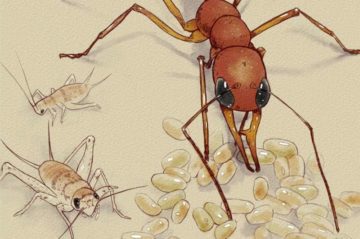From Phys.Org:
 Depending on the outcome of social conflicts, ants of the species Harpegnathos saltator do something unusual: they can switch from a worker to a queen-like status known as gamergate. Now, researchers reporting in the journal Cell on November 4th have made the surprising discovery that a single protein, called Kr-h1 (Krüppel homolog 1), responds to socially regulated hormones to orchestrate this complex social transition.
Depending on the outcome of social conflicts, ants of the species Harpegnathos saltator do something unusual: they can switch from a worker to a queen-like status known as gamergate. Now, researchers reporting in the journal Cell on November 4th have made the surprising discovery that a single protein, called Kr-h1 (Krüppel homolog 1), responds to socially regulated hormones to orchestrate this complex social transition.
“Animal brains are plastic; that is, they can change their structure and function in response to the environment,” says Roberto Bonasio of the University of Pennsylvania Perelman School of Medicine. “This process, which also takes place in human brains—think about the changes in behavior during adolescence—is crucial to survival, but the molecular mechanisms that control it are not fully understood. We determined that, in ants, Kr-h1 curbs brains’ plasticity by preventing inappropriate gene activation.”
In an ant colony, workers maintain the colony by finding food and fighting invaders, whereas the queen’s main task is to lay eggs. And, yet, it is the same genetic instructions that give rise to these very different social roles and behaviors. By studying ants, Bonasio and colleagues, including Shelley Berger, also at the University of Pennsylvania, wanted to understand how turning certain genes “on” or “off” affects brain function and behavior. Because Harpegnathos adults can switch from a worker to a gamergate, they were perfect for such studies.
More here.
